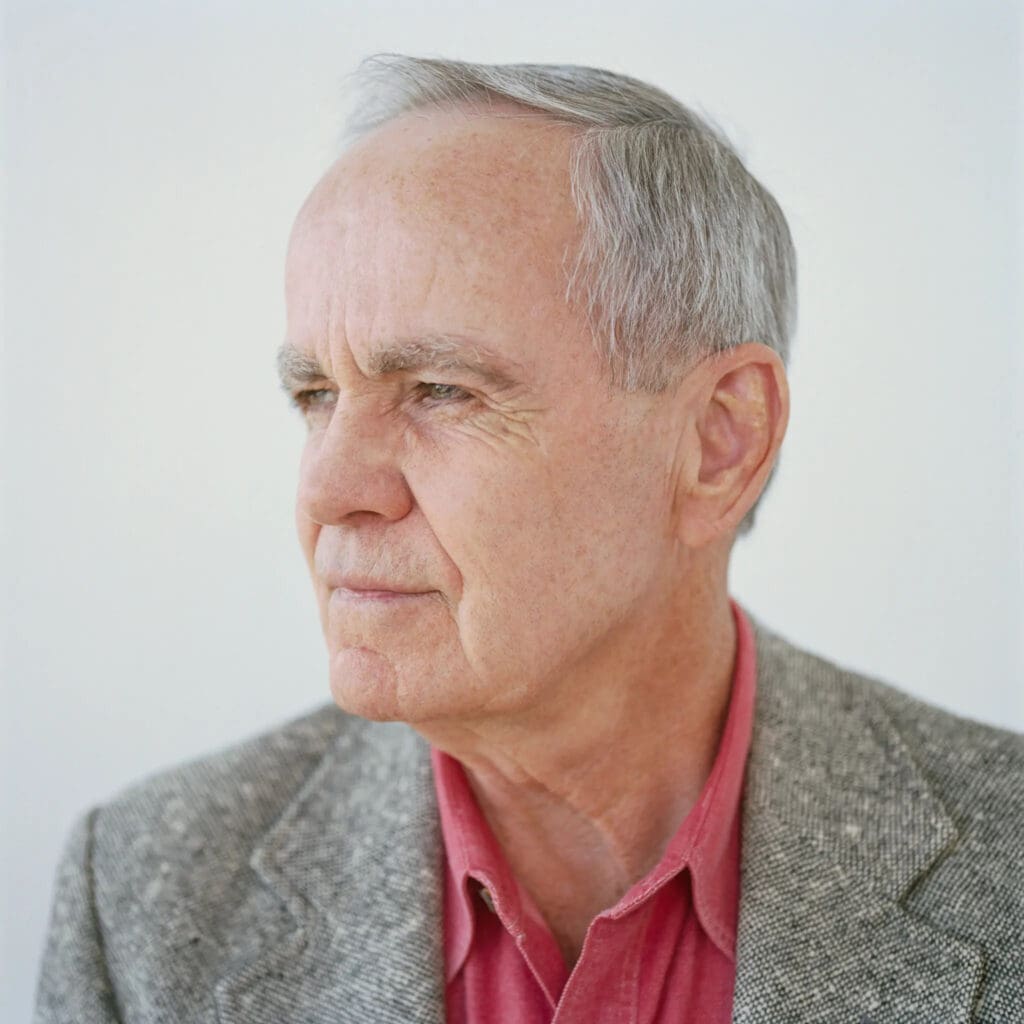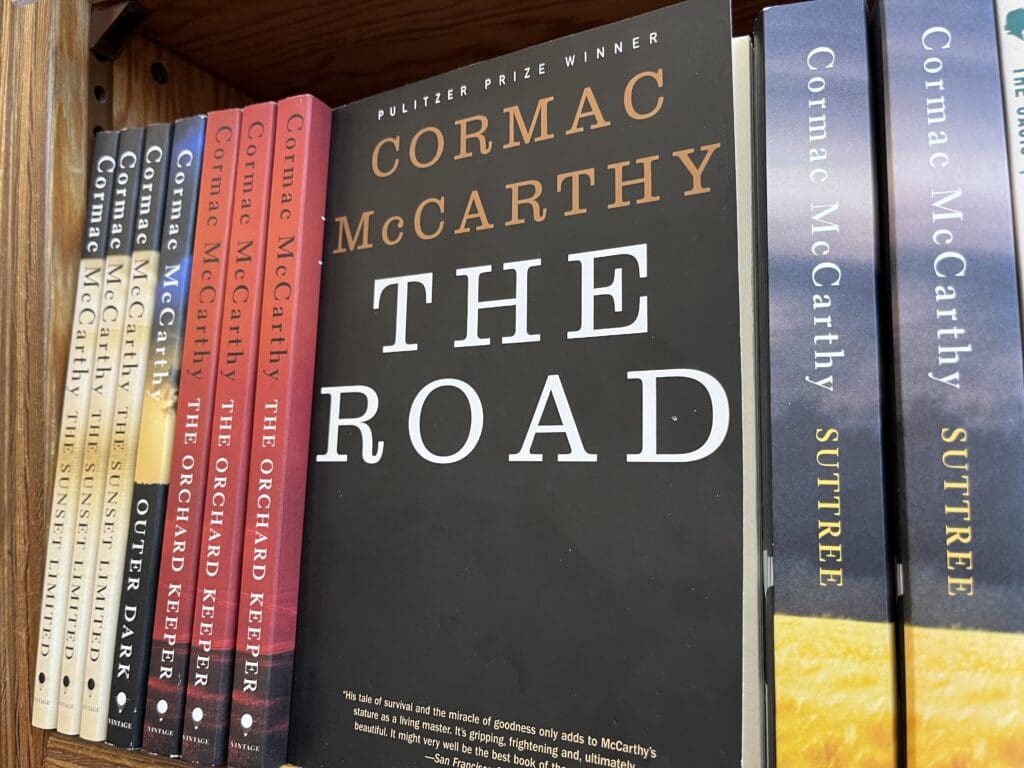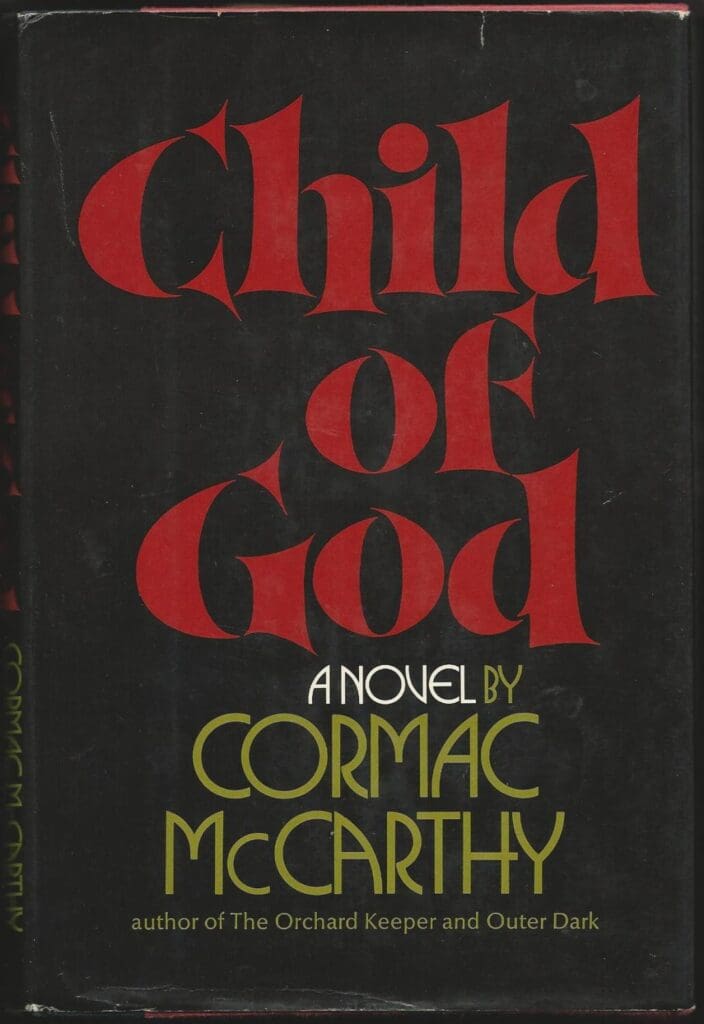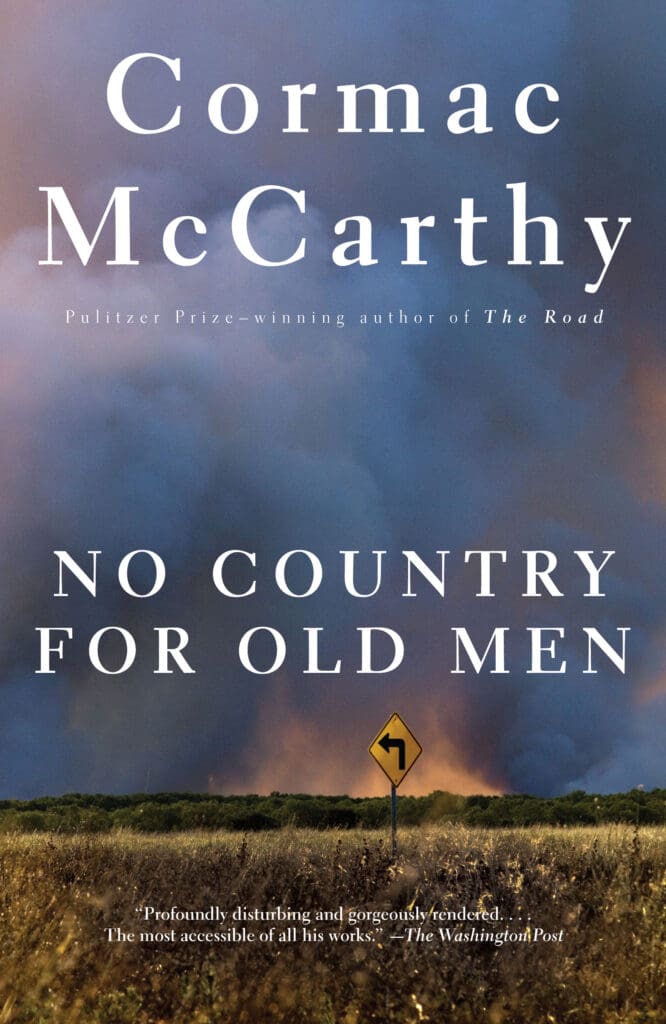I liked him early on, this author. I read him, and I kept reading, hungry for more.
At nineteen, a student of college literature, bored of portraits of artists and odes, I discovered the author at a used bookshop. In little time, I took to him more than any writer on my syllabus.
I admired the brute stories the author put to the page. So clear-eyed, but defiant. And terrifying. An uncontained heat drew me to them. The author’s radical diction and syntax were at war with the rules I had always been taught.
Punctuation be damned, the books said—who needs it? No use for quotation marks or apostrophes or semicolons. Words shoved together. Quote-less conversations tucked into inside the same paragraphs. To hell with Strunk and White.
The author was my kind of lofty literary criminal, a high priest dealing in apocalyptic visions and biblical designs. Horsemen and outlaws brought to hell and back, or sometimes just left behind. There were few heroes in the author’s landscapes, only giant bald apostles of death and teenage wranglers and lone wolf drifters. As an angry young man without a map of masculinity, I felt delivered. The author was what I needed, and what I hoped to find.
Novels aren’t made of ink and pulp, they are made of people. This is made of me, the author whispered through his pages—this ascetic, this living phantom: Western Salinger, theological Pynchon, an unreachable literary monk.
Outside my college apartment window, a butcher shop’s pole light colored his pages red—like so many of the author’s sunsets.
Like most of us, I knew little about him—except for the words he slammed onto the page with a typewriter. His sentences were muscular, yet so precise as to be almost delicate.
But I did know the author. We knew him through his intense and ultraviolent misfits—loners, bootleggers, murderers—all nearly torn from the pages of Revelations. A messed-up bunch, devilish louts. Characters with names nicked from dime novels: Billy, Jimmy, John.
Names familiar to me—family.
Like with my ghost of a father, I blanketed the author in myth: both desert wanderers, monsters of intellect, and makers of reverent things, like Gods.
At nineteen, I carried with me the hushed notion of someday writing a novel but had nothing to my name except homemade punk zines. The author was the first to arouse in me the courage to try. He was a man of letters to admire, an insolent prophet, a man to admire, which I craved. He showed me the significance of the hot high desert landscape of my fatherless youth. His novels helped me cope and learn from that sharp young rage haunting me.
Harness the fury, the books said. Point the hurt to the page. Order out of chaos. Keep sentences simple, brave. Make the reader earn their understanding. Don’t freely give it. Build characters that interest you, even if they are grotesque darlings.
The author’s black-and-white Marion Ettlinger photo was a literal pinup on a cork board above my desk.
And his characters—what an unforgettable lineup.
The Southern, cave-dwelling, necrophiliac serial killer? I read about that one early on.
Child of God was a horrendous book, and I loved every page.
And the fate of the poor infant in Outer Dark? Born of incest and abandoned and sacrificed during a scene I have vowed to only stomach once in this life.
The author’s novels were as violent as the Old Testament and several bounding steps beyond Faulkner. His characters existed more in the territory of The Book of Judges, doctrinal and hellbound. He was almost religious about his meticulous descriptions of depravity.
Characters like his made me ask questions about the man. Did some human mercilessness accompany the author’s brilliance? Did he escape into fiction to confront demons? But sometimes the most horrendous thoughts are markings not of a cruel mind but an exceedingly moral one.
The author’s novels gave me clues to his biography, too: from muggy Tennessee, later transplanted to the smoldering borderlands, exactly like the runaway kid of Blood Meridian.
And again, how that novel’s Westernized biblical atrocities put thunderclaps to my mind.
Young writers need such unexpected thunderclaps to shock them, or else they are doomed. They also need bookstore mentorship for discoveries like mine.
The ugly fact is books are made of books, the author once said in a rare newspaper profile.
Throughout the years, I read up on the author, researched him, a side hobby of mine. Few interviews, too few.
The author had been an altar boy too, stained Catholic, made to serve, coached in sin and absolution, drowned in endless stories of the desert journey, which explained his scriptural visions of Southwest wastelands.
I kept eyes on him, saved newsprint clippings.
Early on, the author had a series of poverty years during which he carried with him a lightbulb, motel to motel, for better reading. That detail I got from the newspaper profile.
The more I learned about the author’s middle years, the more he seemed like one of his own outsider creations, once occupying an uninhabitable barn, vagrant-like, no day jobs, with a wary wife in tow. Beyond sustaining himself on literary award cash, he did not associate with, or know, or want to know, other writers. He had a chronic allergy to self-promotion, which was refreshing. Just wasn’t in his nature. The author was a singularly American writer who disliked the American literary circus, an especially delicious detail underscored by his no-show when he won a Pulitzer.
Just the kind of foundation needed to sustain myths, or cults. Naturally, a society formed around his work, with conferences, and a journal, scholarly articles.
It was, though, the mythmaker’s books that mattered, and they continued to teach me.
Be true, they said. Eye rules with suspicion.
Be unwilling to compromise.
He carried three divorces in his personal papers.
The author belonged to the logic and order of a vanished literary world, where writers, far afield, mailed un-agented manuscripts to New York publishers in high offices where carousing editors drank and smoked and talked talent, not sales. In fact, he didn’t have an agent for a long while. This author’s early novels were marvels, but sales were unremarkable until his sixth, All the Pretty Horses.
His hatchet wasn’t sharp in that one. Less blood, even levity. Cowboys romancing the desierto Chihuahua. Love for horses and scrubland and the vanishing range life. The author had softened and continued to use untranslated Spanish.
Avoid foreign languages: Strunk and White’s twentieth rule of style.
Later the author hardened again. The way Anton Chigurh operated his pneumatic death tool in No Country for Old Men seemed inspired by a fever dream. The author returned to massacres, only now among drug runners. To me, No Country read less like a novel than a film treatment. At the time, the author was writing plays, screenplays. He loved films.
Only the novels interested me.
Years later, I happened to move to the same desert state as the author, the same small town.
My first book was out. I was thirty-two. The same age as when the author’s first had appeared.
By then the author was an almost-character to me, a living statue, some mythic holy man canonized and beyond reach, and yet one day here the author was, standing in front of me at the local bookstore.
Cattleman boots. About the same height as me. Middle of the morning, shirt tucked in and belted jeans. Rancherwear. The same lined handsome face, colorized, as the crinkled photo on my fridge door. High-foreheaded too, like me. Like my father.
He walked around, browsing.
I walked around, browsing.
I did not bother him.
I saw him often while living in that town. At the bookstore. At Tesuque Village Market, where he sat reading The New Yorker. At La Fonda, a restaurant, a few tables over. A reporter in a newspaper described the author as a creature of the past, a person who didn’t even own a cellphone. The power of his public silence was undeniable, so people invented into the void. But he did have a phone, and he once misplaced his inside a bookstore and asked the employee, a young writer, to call it. The young writer never deleted his number.
The author was around. He wasn’t a monk. I still did not bother him.
What was it about unreachable men? And why, when it came to unreachable men, like my unknowable father, did I always want to reach out? What did I hope for in the exchange, and wasn’t it better to grant anti-heroes their lonesome wishes to be left alone?
But I did think about it, sure. Talking to him, next time, approaching.
I asked friends about the author. You don’t bother him, they said, and if you happen to meet him, you don’t ask about his work. He’s intensely private.
What might happen? Just don’t, they said. He’ll walk away.
In the bookstore, I was told, that’s what he did. Surprise him and he’ll walk. Just leave.
The author, much older than me, occupied an office at a local scientific think tank and lent a hand as a copyeditor on his colleagues’ papers. Meeting in person with my decades-long admiration would probably not be a welcome event. But would venturing too close to him really be like scaring a coiled rattler? Was he really so wary of writers?
People warned me off him, so I never approached.
This didn’t diminish my curiosity. I adored how some fellow writers bristled at the mention of his name. Bald machismo, they said, too inaccessible, don’t like him.
These writers dismissed him outright, not because of his novels, but only suspicious of his refusal to be public. They invented reasons to dislike him, muddled trash talk the way some people do of others to shine themselves up.
Too many overlooked what the author’s ultimate project was about. The search to understand what it means to be a man, in the flesh as well as part of this weird, indifferent cosmic existence of ours. He wanted to understand the light and dark in us, and what better stripped tableau to examine such concerns than the desert?
Of course, I heard stories about him, about parties and celebrations, down state, way down, years earlier over state lines in El Paso, after the author won his National Book Award. A catered event. He consorted with lawyers. His father had been one.
When I later relocated to this same borderland, to the territory of Blood Meridian’s Judge Holden and the scalp-hunting Glanton Gang, a friend took me on a round-the-city tour of El Paso, where he showed me the author’s old white stone two-bedroom house, on Coffin Avenue, two miles from the corrugated Juárez wall.
I snapped a photo.
My friend introduced me to old acquaintances. The house, they said, was where he wrote the Border Trilogy. Folks later tried to buy the place, turn it into a writers’ residency. No dice—environmental concerns. The dirt outside was bad.
Stories floated my way. How one person rooted through the author’s trash, cataloguing souvenirs, showing them off like Toadvine’s necklace of ears.
How he did not want to be interviewed by the big TV personality about The Road. Just didn’t. Had to be convinced.
How the author irritated neighbors with his collection of junker broke-down cars on his property, his old pickup parked on what constituted a front yard.
Stories, stories.
The author could surprise. He liked golf, common-folk cafeterias, and once white water rafted with friends down a cold Rio Grande through Santa Elena Canyon and spent the night on the bank during extreme high water.
Way back in the day, around the time I was born, the author relocated to the borderland, a man with an atypical career in those parts. He was a writer, not yet anointed. He was that author feller, private is all. Pleasant enough company, I was told. Handsome, good listener, smiled to deflect personal questions, didn’t give up much. Alone a lot, but observant, searching, burdened by a mind consumed by its task.
I did not ask his old acquaintances about personal details, the failed marriages, his sons. But I knew things from news clippings. Estranged in the ’60s from his first-born son, when the boy was just a toddler, the same age I was when my father left. His ex-wife’s obituary read like a partial indictment.
I once asked a question about him to myself: was his relocation to the extreme Southwest desert a symptom of hidden shame? That had been my father’s way. Desert life, after all, could feel like punishment.
But you stop asking questions when you don’t want true answers. You might trip on an answer that could ruin your reverence. You either learn to separate the writing from the sin, or not, and if you cannot, then the art on your walls and books on your shelf and music in your player will go missing. Can’t have art without the human flaws behind it.
After the author’s death in June, I felt the pinch of sadness of when an idol falls. I considered the news story on my screen, in silence, all the help I received from his demanding books, those brutal lessons. The direction they pointed me.
I sat in my chair and thought. About my desert years, his novels that filled my time spent along the border. I thought about this Southern author’s compass, and how it stuck on the Southwest, the skies redder than those over his youth’s Appalachian Blue Ridge.
The desert is the landscape of the Bible, overpowering and eternal, its heat and light forever apparent, the openness and nothingness of it, birthplace to creation myths. Nowhere on earth like it. Here the author’s Southern gothic characters slid into the dirt, swallowed by harsh atomic landscapes so unforgiving that even his best sinners couldn’t but summon the relief of prayer.
Three decades since discovering the author in that used bookshop, he’s now, I understand, a sort of grandfather in my lineage. All writers belong to some branch of the tree. He’s more root-like. I’m the little leaf out there, shivering in the wind. The author’s many tough words linger larger inside me than those few spoken to me by my late father.
And even now, from time to time, I ask folks who knew the author to provide one more story, a bit of personal color. But time does its job well, time blots out specifics, and any shared remembered stories about him are mostly general and vague, open to doubting, or prime for mythmaking. And so again, what remains are the words he put on the page, which is enough.
I am still able to see him in that shadowy author photo, in the books here on my shelf, as a figure to admire—and like my own father, unreachable and always at a distance. But as with the shared blood of men, I know I would not be here if not for him.
Don Waters is the author of Desert Gothic and, most recently, the memoir These Boys and Their Fathers.





